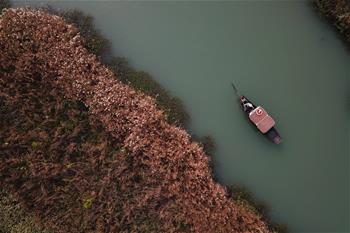ATHENS, Dec. 5 (Xinhua) -- Foreign investors and Greek officials agree that Greek state companies need to improve their governance, competitiveness and reduce their risks to become more attractive to investors.
"The more effective the government and its political institutions are in managing the assets and liabilities of the people, the more positive we are in investing in the country," said Paul Kazarian, head of Japonica Partners, an investment firm, in an interview with the website Capital.gr published on Wednesday.
The chairman and CEO of the U.S.-based private equity firm, which until recently was one of the biggest investors in Greek bonds, said "the countries that do the best job in managing their balance sheet offer the lowest risk for an investor, and then they allow us to focus on what we can do best, which is marketing, logistics, manufacturing. This makes us more interested in investing in countries."
"We continue to look at Greece for additional investments," he added.
Rania Ekaterinari, chief executive officer of the Hellenic Corporation of Assets and Participations SA (HCAP), told a conference organized in Athens by the American-Hellenic Chamber of Commerce on Tuesday that there are three conditions for investors to boost the revenues for the asset management company.
She explained at the 29th Greek Economy Conference that the first condition is credibility of state corporations' financial figures and of their estimates for their course over the next five years.
Companies cannot seek credit without explaining their cash flow for the next three to five years, Ekaterinari stressed, explaining that several state corporations even lacked a crisis management system before they entered the HCAP fold.
The second condition is that corporations have an open communication policy and are ostensibly extrovert, and the third is that they employ corporate governance rules that promote transparency and internal monitoring. The corporations applying high standards on issues of transparency and corporate governance are those that attract the most investment, said the HCAP chief.
She added that the administration systems her corporation now applies to state companies in the HCAP portfolio have attracted the interest of countries in Central Europe for the transfer of knowhow.
State enterprises must also renew their staff through hiring young workers with skills in new technologies, the Greek executive argued, calling also for the application of assessment systems so that the efficient employees can advance. The average age of employees today at state corporations is 54 years, she noted.
Referring to the other assets of her company, Ekaterinari highlighted the 14 Xenia hotels across Greece that are going to be conceded after being out of operation for years. She stressed that their concession is set to benefit local communities when they are privatized.
The CEO of state assets corporation also estimated that this year's privatization revenues are expected to total 2 billion euros (2.26 billion U.S. dollars), against 1.4 billion euros (1.59 billion U.S. dollars) in 2017.
In total, revenues from the utilization of state assets since 2011 and the foundation of the Hellenic Republic Asset Development Fund, an HCAP subsidiary since 2017, have reached 7 billion euros, Ekaterinari stated.
The bulk of this year's privatization revenues is from the concession of Thessaloniki Port Authority and the extension of the concession contract of Athens International Airport.













